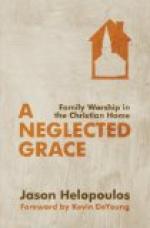And thus the home-sympathy demands that all the emotions of home, whether joyful or painful, must affect all,—must vibrate from heart to heart. It involves the power of home-transference, by which, each member conveys to his own affections, all within home. It is thus the law of adaptation and assimilation, for the home-affections. In obedience to this law the hearts and interests of the members are bound up in beautiful harmony. The necessities of one are supplied by all. It is this which makes the members faithful to each other, and prompts them to deeds of disinterested love.
It is, therefore, only when the home-sympathy, as a feeling and a faculty, is carried out and acted upon according to its instinctive impulses, that it becomes an effective agent of good. This, however, is not always done. Often it is neutralized by not being permitted to express itself according to the laws of its own operation. Many members have acute feelings and great powers of sympathy, but it exists in them only as feeling, only as a stimulus, a sentiment, and is, therefore, nothing but home-sentimentalism,—a disease of home-sympathy. Thus, for instance, parents may weep over the wickedness of their children, and the pious wife may lament the impenitence of her husband; but if they go no further, their sympathy is really false, because it does not share in and feel the state of others, nor seek to alleviate their impending miseries. The home-sympathy is not simply the look of the priest and Levite upon the half-dead traveler, but also the help of the good Samaritan. Its language is not only, “Be ye clothed and fed,” but also, “I will clothe and feed thee.” The mere indulgence in the feeling of sympathy is but to harden the heart in the end. Such were the sympathies of Rosseau,—mere heart-stimuli, without legitimate deeds and objective force, existing only as a love-sick sentiment. And this was both the theme of his eloquence and the cause of his misery. Such, too, were the sympathies of Robespierre,—a mere ebullition of disembodied sentiment, borne up like a floating bubble upon muddy waters, and exploding upon the slightest depression.
But, on the other hand, when home-sympathy is issued in faithful action as its emotions prompt, it becomes an efficient agent in the happiness and peace of the family. It not only gives eloquence to the tongue, tears to the eye, but faithfulness to the life. It serves as a key-note to the mind and heart, framing the home-energy, revealing to us our real state, and prompting, by the instinct of love, the means for our highest welfare.
“How glows the joyous parent to
descry,
A guileless bosom true to sympathy!
A long lost friend, or hapless child restored,
Smiles at his blazing hearth and social
board;
Warm from his heart the tears of rapture
flow,
And virtue triumphs o’er remembered
woe!”




